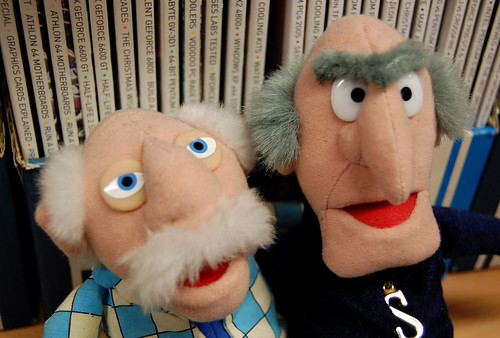Imagine my shock and dismay when I realized that not everyone shared my vision! At one of our PD events a small group of teachers were chosen to lead the School Division in it's literacy initiative, a couple of teachers sat at the back and openly ignored our colleagues' presentation. One of the reluctant teachers read the paper, while another marked assignments, and occasionally they whispered loudly to one another about the hockey game. It was obvious that they thought this PD event was a waste of their time, and they made not bones about it. I could not believe they wouldn't give their colleagues the courtesy to at least pretend to listen. They reminded me of the two old grumpy Muppets who sat in the balcony interjecting their negative comments about the performance. I was really disheartened about it, and I quickly learned that teachers have to be willing to develop - they have to "buy-in" - or PD is useless.

Photo courtesy: Alex Watson
While this Professional Development event was about literacy, it could easily have been about technology. It got me wondering - what was wrong with this whole PD experience? Why were there dissidents amongst our ranks? I now believe there were two main problems:
1. This PD session was delivered as a performance to teachers who had to buy-in to the change that was expected to take place. Teachers were told what they needed, rather than asked what they felt they needed. Participation wasn't optional, and there was no customization in play. We were all treated equally - regardless of our subject areas, our teaching experience and our grade levels. As Judi Harris so eloquently put it, when it comes to educational professional development, "One size doesn't fit all."
2. PD should no longer be broadcast through a manual or a CD Rom - Professional Development - especially in technology - should match the very interactive, constructivist and social nature that parallels the very web 2.0 technologies it seeks to support.
Creating a Buzz
How would the two old Muppet grumps at the back of the room responded had this professional development occurred through a different medium than the old standard intructor-led presentation? Consider what would have happened had the "buy-in" premeditated the workshop. Imagine if the Director and School Administrators had followed Camilla Gagliolo's advice in Help Teachers Mentor One Another. Gagliolo's steps for creating a mentoring environment include:
• Identify early adopters and risk-takers who are ready to explore emergent
technology integration ideas
• Plan collaboratively with a focus on student learning
• Create a network of support by holding regular meetings and short training sessions
• Provide extra training and learning opportunities outside the regular network (e.g., attend a conference together)
• Co-teach in the classroom (e.g., provide the extra support when implementing new ideas in the classroom setting)
• Provide personal, ongoing, technical, and pedagogical support
• Observe classroom learning with constructive feedback
• Celebrate success (e.g., share at staff meetings, post on a Web site,
co-present at a local conference, co-author an article)
• Create professional development
I think if even a few of these suggestions were followed, the School Division would have experienced much more success in their PD initiative. Of all the points, I feel "celebrating success" is one of the easiest to institute, but it's also vitally important because it helps to create a buzz in the school, and the ripple effect may actually lead reluctant teachers to become curious about new methods. In One Size Doesn't Fit All, Judi Harris remarks:
"[o]ne of the most popular forms of collaborative learning ETPD [educationalThis sharing of success at a grass roots level (such as at your staff meeting), helps to invite bigger professional development opportunities such as mentorship and collaboration; or could lead to an acknowledgment that an expert speaker is needed to facilitate a preferably hands-on workshop experience that teachers are eager to attend and learn from.
technology professional development] is sharing best practices. This can be done
face-to-face or online, and in multiple formats, such as study groups,
conference SIG (special interest group) or birds-of-a-feather meetings, and
online communities of teachers."
Muppet Grumps 2.0
Imagine a 2.0 version of The Muppet Show - the two old grumps would have their i-pods on while texting their comments to Kermit the Frog on their cell phones. They would be blogging their critical reviews of the performances on their laptops even before the fat piggy sings.
Enter from stage left a critical thinker like Judy O'Connell. In Learning Is a Multimodal Conversation she makes a very valid point, that in today's web 2.0 world - the on-line community is already engaging in professional development.
"Bloggers regularly write about Web 2.0 online applications for students,
sharing ideas, tips, and tricks for engaging our digital natives in learning. . . .
As we pour our own words, tags, sounds, images, and multimedia into the
ever-increasing global knowledge and information pool, we have to become adept
at patterns of connectivity in these learning contexts."
With this in mind, I would be very tempted to follow PD activities with an on-line access point to continue to share/think/create. Blogs, nings, podcasts, video and wikis have made it easy for teachers to participate in the "global multimodal conversation" that O'Connell calls "[l]earning."
If we ourselves are using the Web 2.0 tools to further our own education, then it is only a matter of time for reluctant teachers (or grumpy Muppets) to see how useful these tools can be in our student's learning.
![Tea for [Web] 2.0](http://2.bp.blogspot.com/_TsvvkpOCiVk/SYjp4GzflMI/AAAAAAAAAKY/PZ6k4aTfq9s/S768/carol+tea+header.gif)

No comments:
Post a Comment